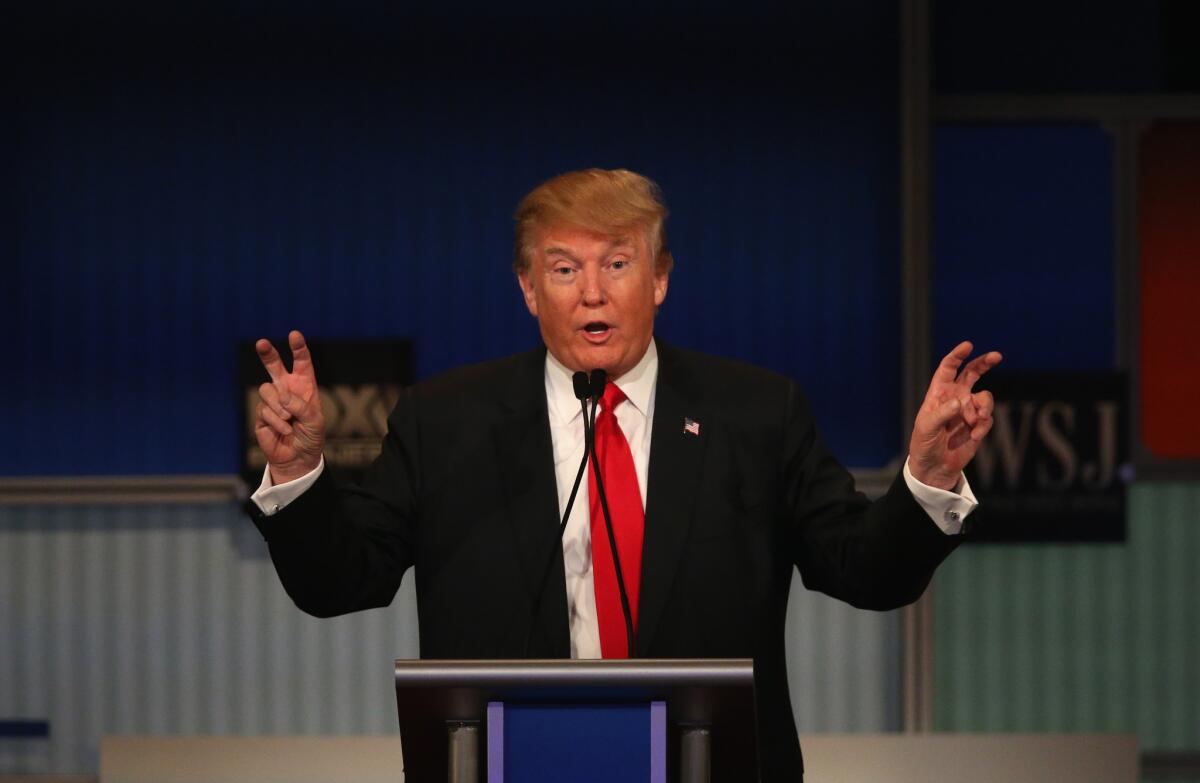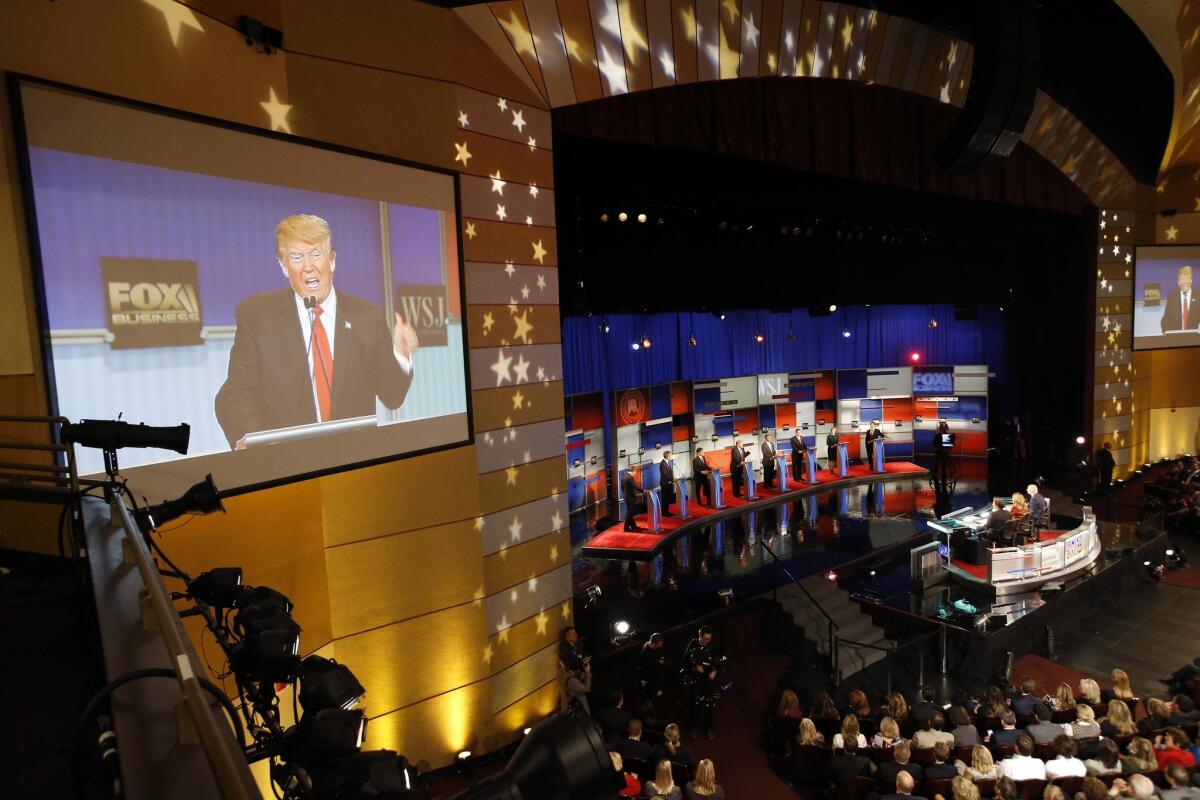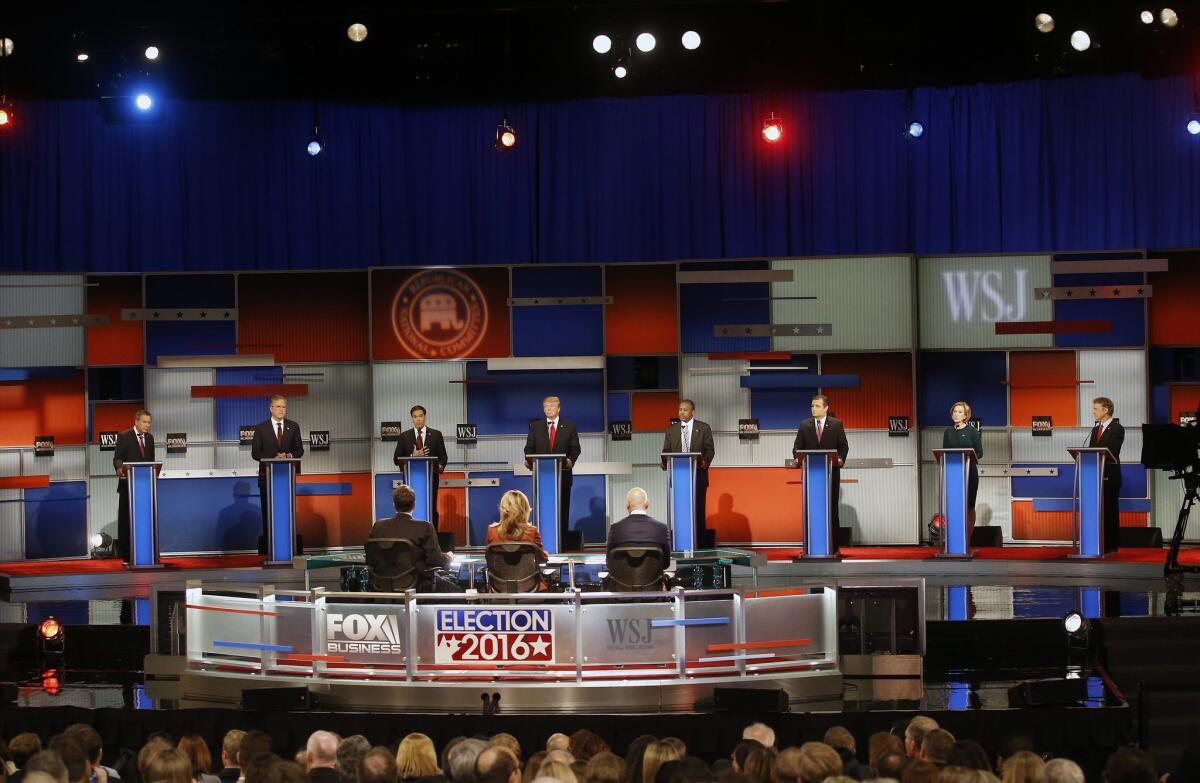Republican debate aftermath: Candidates jab each other but race appears largely unmoved
By the numbers
Welcome to Trail Guide, your daily host through the wilds of the 2016 presidential campaign. It's Wednesday, Nov. 11, and this is what we're watching:
- Does this video show a Jeb Bush snub of his old mentee Marco Rubio?
- The day after the debate, Donald Trump repeats his assertion that U.S. "wages are too high."
- Last night's debate produced plenty of clashes but little clarity , The Times' Michael A. Memoli, Michael Finnegan and Kurtis Lee report
- But little that happened Tuesday is likely to significantly alter the race, The Times' Cathleen Decker writes
- Decker and Seema Mehta watched the debate so you didn't have to and break it down in just a few minutes
- Takeaways : Marco Rubio does his best on defense, and immigration is cementing itself as the most divisive issue in the party
A debate stage dis by Jeb?
Was this a debate podium snub of Sen. Marco Rubio from onetime political mentor Jeb Bush? In this Vine video from CNN, during a break, Rubio approaches Bush, who seems to dismiss him with a curt shake of his head. The relationship between the two Florida politicians has turned frosty since Rubio has overtaken Bush in polls; Bush's supporters have threatened a bombardment of negative ads against Rubio.
âThat may look that way, but thatâs not what happened. Weâre fine,â Rubio said on ABC's "Good Morning America." âLook, weâre running for president of the U.S. I know it makes for an interesting Vine video but it really wasnât anything of meaning.â
Trump doubles down on claim that U.S. 'wages are too high'

Donald Trump makes a point during the Republican presidential debate in Milwaukee.
It was a debate remark so unusual that some people thought it a slip of the tongue, but on Wednesday, Donald Trump redoubled his claim that U.S. "wages are too high."
"We have to become competitive with the world," he said Wednesday in an interview on MSNBC's "Morning Joe" broadcast from St. Anselm College in New Hampshire.
"Our taxes are too high, our wages are too high, everything is too high," he said. "People are going to start firing people" because costs are excessive, he added.
Most presidential hopefuls this year, including all of the Democratic candidates and many of the Republicans, have argued the opposite -- that stagnant wages for American workers are a central problem facing the economy.
Trump, however, stuck to his line, even as he conceded that it might not be popular.
"We're becoming a non-competitive country, that's the problem," he said. "It's a tough position politically," he added, "first time in my life I'm a politician."
How politically tough his stance proves may depend on whether any of Trump's rivals decides to make an issue of it. For almost any other political figure in almost any other campaign year, a public claim that Americans are paid too much would be considered a career-ending event. Trump, however, has already survived several remarks that political analysts and Republicans running against him thought fatal to his campaign.
This remark, however, could have the potential to damage Trump more than others because his strongest base of support has been among blue-collar Republicans, who may be particularly sensitive about being told that workers earn too much.
Support for Big Sugar a sticky issue for Marco Rubio
As the Republican presidential contenders spar over cutting taxes and slicing the federal budget, a sticky political situation is developing for Florida Sen. Marco Rubio â his backing for taxpayer subsidies for his home state sugar industry.
During Tuesday nightâs debate, Sen. Ted Cruz indirectly took a shot at Rubio, who has accepted big campaign contributions from Florida sugar growers and continues to back a federal program that keeps the price of sugar artificially high for consumers in the U.S. Rubioâs stance has come under fire from free-market conservatives, and in a recent editorial in the Wall Street Journal.
âSugar farmers farm under roughly .2 percent of the farmland in America, and yet they give 40 percent of the lobbying money,â Cruz said. âThat sort of corporate welfare is why weâre bankrupting our kids, and grandkids.â
Rubio stuck by the industry in post-debate interviews Wednesday. âThe problem is every country in the world that grows sugar has a program, a subsidy,â he said on "Good Morning America." âSo when they get rid of theirs, Iâm prepared to get rid of ours. But Iâm not going to wipe out an American industry that happens to have a lot of workers in Florida by unilaterally disarming.â
For decades, Big Sugar has held a lot of political juice in Florida and Washington. The industry spent $9.6 million in lobbying last year, and is on pace to top that this year, according to the website Open Secrets. The industry also gives millions in campaign contributions to politicians in both parties â Rubio among them.
Florida Crystals, the company owned by the Fanjul family of West Palm Beach, has donated $105,000 to Rubioâs campaigns, according to the website Open Secrets, the fourth largest total among Rubioâs supporters. In April, Lourdes and Pepe Fanjul Jr. held a fundraiser for Rubio at their Palm Beach home.
And the Fanjul family has enjoyed unrivaled political access. In 1996, when President Clinton was behind closed doors in the Oval Office, breaking things off with Monica Lewinsky, he was interrupted by a phone call from Alfonso âAlfyâ Fanjul, who wanted to talk against a proposed tax on sugar to help clean up the Everglades. Clinton returned the call as Lewinsky was leaving, the Kenneth Starr report found. The two spoke for 22 minutes.
Early numbers: Debate drew 13.5 million viewers
That means Fox Business Network got nearly as many viewers Tuesday as CNBC did for the previous debate. But it's well short of the 23 million to 24 million who watched the first two Republican debates, albeit on more widely known networks.
The debate broken down for you in less than three minutes
The Times' Cathleen Decker and Seema Mehta on the highs and lows -- and the winners and losers -- during Tuesday's GOP presidential debate. They also examine how the candidates divided on immigration and other issues.
Immigration debate was missing a voice: Marco Rubio's
One voice lost in Tuesdayâs spirited, if clarifying, exchange on immigration was Marco Rubioâs, whose views may have been most interesting to hear during the Republican debate.
Rubio, once an architect of a bold immigration reform plan â which included a path to citizenship for the 11 million or so immigrants in the country illegally -- has since taken a more nuanced approach.
But as the Republican Party divide over immigration erupted on full display Tuesday night, the Florida senator declined to jump in the fray.
Donald Trump promised âto send outâ immigrants here illegally, and former Florida Gov. Jeb Bush fired back that mass deportations are ânot embracing American values.â
Ohio Gov. John Kasich called Trumpâs deportation plan âsillyâ; Texas Sen. Ted Cruz aligned with the billionaire Trump in opposing âamnesty.â
Rubio, though, whose own parentsâ immigration story is central to his campaign, stayed silent.
Immigration remains among the most difficult issues for Republicans, who are trying to court the growing number of younger Latino and minority voters, but risk alienating older white Americans who view immigration reforms less favorably.
Rubio still believes the current âchaoticâ immigration system needs to be fixed, but he walked away from his own comprehensive overhaul crafted as part of the Senateâs âgang of eightâ two years ago.
He wants to eventually end President Obamaâs executive actions, which suffered a legal setback this week, and halt new enrollments in the Deferred Action for Childhood Arrivals program. The program shields some 700,000 immigrants from deportation if they are law-abiding and meet certain military or educational criteria.
Rubio has not abandoned a path to citizenship for the 11-million people in the country illegally, but no longer promotes the issue and gave it scant mention in his policy book âAmerican Dreams,â which was published this year.
Instead, he now prefers a step-by-step approach to immigration reform favored by most Republicans. It would begin with border security and other enforcement measures before turning to the issue of what to do with those in the U.S. illegally.
âThis is my position; itâs been well-stated for a long time, and I think itâs really the only way forward on immigration,â Rubio said Wednesday on ABCâs âGood Morning America.â
This strategy, though, has been panned by immigration advocates who believe it would fall short of producing holistic reform.
And it was not something he chose to share on the debate stage.
Donald Trump takes shots from rivals on Syria, immigration

Donald Trump makes a point during the Republican presidential debate in Milwaukee.
Donald Trump has used prior Republican presidential debates to great effect, with eye-popping statements about his skills and his rivalsâ weaknesses to grab headlines, create spectacles, deny other candidates attention and win over voters who are sick of status-quo, milquetoast politicians.
But Tuesdayâs debate was more substantive and less personality-driven. Fewer candidates participated, for one thing, and there were more opportunities for meaty policy exchanges. That made it harder for Trump to maintain his edge on stage.
During the Fox Business Network debate, Trump still got more time than most of the other candidates at the Milwaukee Theatre, but the businessman-turned-reality-television star spent much of the time on defense.
In the debate's early moments, two candidates who needed to make a strong impression â former Florida Gov. Jeb Bush and Ohio Gov. John Kasich â double-teamed Trump over his call to deport everyone who is in the country illegally.
Analysis: Debate invigorates some struggling candidates

Donald Trump is seen on the screen as Republican presidential candidates John Kasich, Jeb Bush, Marco Rubio, Trump, Ben Carson, Ted Cruz, Carly Fiorina and Rand Paul appear during Republican presidential debate at the Milwaukee Theatre.
A Republican debate that was supposed to focus on the presidential candidates' economic policies demonstrated their close agreement on the fiscal front but underscored foreign policy rifts that are likely to play out through the 2016 campaign â and gave renewed life to candidates struggling to find their footing in a persistently unpredictable contest.
If the Tuesday night debate, aired on the Fox Business Network, was supposed to highlight the strength of real estate mogul Donald Trump, it did not. If it was supposed to dispense permanently with the candidacy of former Florida Gov. Jeb Bush, it did not. If it was supposed to deliver the same fireworks that exploded in a controversial debate on CNBC two weeks ago, it did not.
As a result, yet another thing the debate probably did not do was scramble the GOP race. The front-runners, Trump and former neurosurgeon Ben Carson, did not shine â Trump came under withering fire on foreign policy, particularly â but their strengths rest on their outsider status rather than on policy proficiency or debating prowess.
Underneath them, however, movement was afoot. Florida Sen. Marco Rubio and Texas Sen. Ted Cruz both had a second-straight strong showing, each weaving his personal, immigrant-heavy story into firm recitations of his priorities.
Bush made a far better presentation than in past debates. But he, along with Ohio Gov. John Kasich, did so in part by embracing policy prescriptions not generally shared by their party â a risky move in the primaries albeit potentially helpful should either man make it to the general election.
Post-debate, Rubio speaks on immigration
Sen. Marco Rubio kept mostly quiet during the heated immigration talk in Tuesdayâs GOP presidential debate, but away from the stage, he spoke out on behalf of Latino Americans in a Wednesday morning interview.
Rubio said on the "Today" show that many in the Latino community legally immigrated to the United States and still have family waiting to come. Americans want a better immigration process, but the government needs to handle those who came in illegally realistically and responsibly, he said.
Before the debate, GOP rival Donald Trump called Rubio âtotally weak on immigration." Trump referenced Rubioâs participation in the so-called Gang of Eight senators who tried but failed to pass immigration reform two years ago.
In the debate, Rubio dodged the immigration discussion mostly involving Trump, Sen. Ted Cruz of Texas, former Florida governor Jeb Bush and Ohio Gov. John Kasich, who divided on hard-line and more moderate stances. Trump pushed his idea to build a wall on the U.S.-Mexico border, while Bush warned that impractical policies will lead to a Democratic win in the general election.
"... [M]y position on [immigration] is well stated," Rubio said in a Wednesday interview with "Good Morning America." "And that is: We have to deal with immigration in three steps. We can't do it all at once. We tried to do that in 2013, and the American people just don't trust the federal government."
The top takeaways from last night's debate

Republican presidential candidates John Kasich, Jeb Bush, Marco Rubio, Donald Trump, Ben Carson, Ted Cruz, Carly Fiorina and Rand Paul appear during Republican presidential debate at the Milwaukee Theatre.
1. The GOP field seems to have figured out how to fight Donald Trump: Belittle him.
2. The moderators survived.
3. Immigration may be the most divisive issue within the Republican Party.
4. Rubio is at his best when playing defense.
5. Several candidates edged in their talking points, but it's doubtful any took a leap.
By the numbers
Get the L.A. Times Politics newsletter
Deeply reported insights into legislation, politics and policy from Sacramento, Washington and beyond. In your inbox three times per week.
You may occasionally receive promotional content from the Los Angeles Times.







